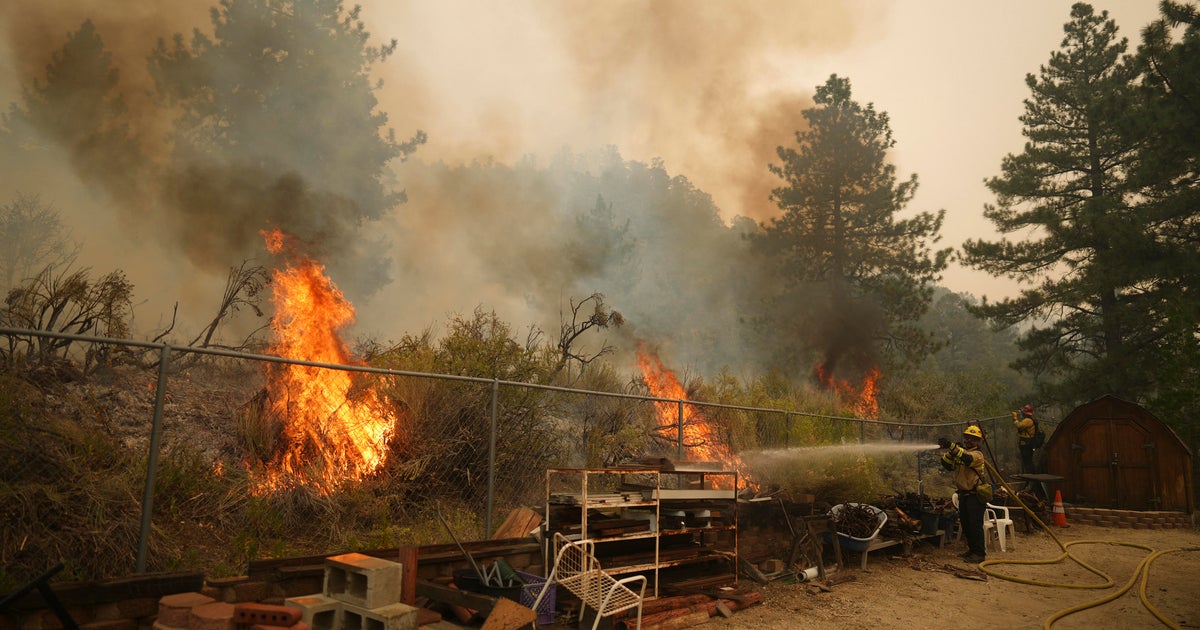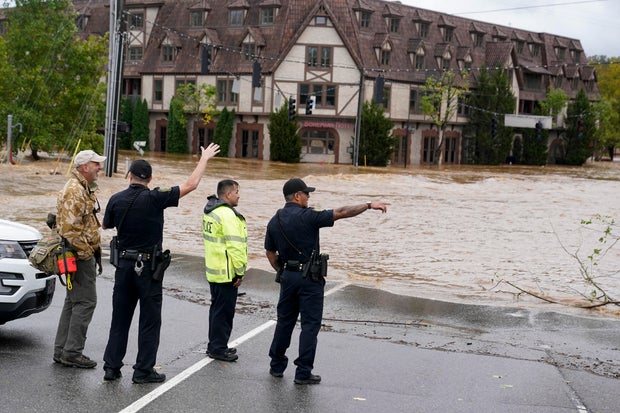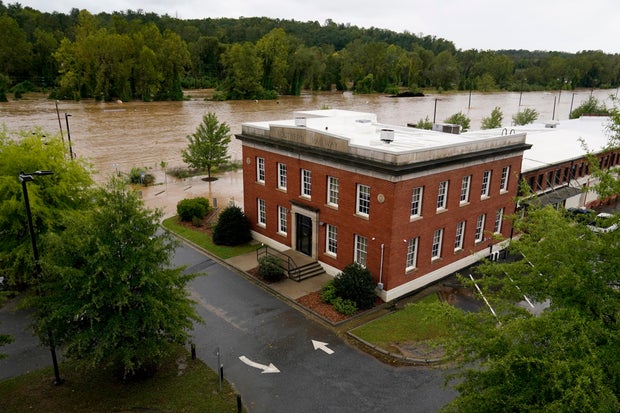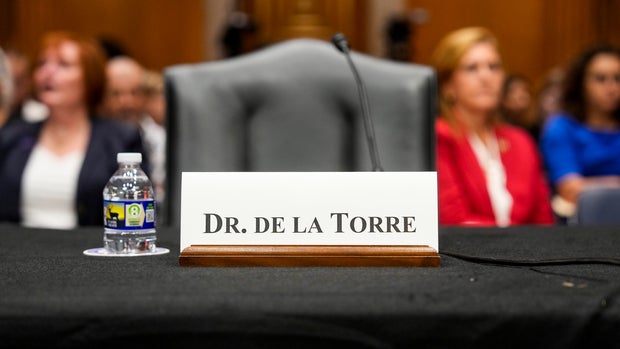CBS News
Maui leaders target vacation rentals in proposal to house more locals

Alicia Humiston bought her condo in Lahaina after she visited Maui and fell for its rainforests, lava fields and the whales that gather offshore. She travels there about three times a year and rents out her unit for short periods when she’s not in Hawaii.
“Maui was my dream place,” she said in a phone interview from her home in Coeur d’Alene, Idaho.
But now Maui’s mayor wants to make it impossible for Humiston and thousands of other condo owners to rent their properties to tourists. Instead, he wants them rented long-term to Maui locals to address a chronic housing shortage that reached a new crisis point after last August’s deadly wildfire burned the homes of 12,000 residents.
The mayor’s proposal faces multiple legislative and bureaucratic hurdles, starting Tuesday with a Maui Planning Commission meeting. Yet it has inflamed an already-heated debate about the future of one of the world’s best-known travel destinations: Will Maui continue to cater to tourists, who power the local economy? Or will it curb tourism to address persistent complaints that visitors are overwhelming the island’s beaches and roads and making housing unaffordable?
About one-third of Maui’s visitors use vacation rentals. They tend to cost less than hotels and are easy to reserve on websites like Airbnb and VRBO. Many have kitchens, so families can prepare their own food.
They have also become a source of strife, particularly after last year’s conflagration in Lahaina — the deadliest wildfire in the U.S. in more than a century. The fire tore through the historic town, killing at least 115 people, and leaving nothing but rubble and ash for blocks. Residents whose homes burned to the ground received solicitations from off-island real estate investors to scoop up their land.
Thousands of displaced locals were temporarily housed in hotels usually reserved for tourists, and most survivors still lack stable housing. Even before the fire, University of Hawaii researchers say so many property owners were renting to tourists — and so few new dwellings were being built — that Maui County suffered a net loss of housing since 2019.
An analysis of property tax records shows 85% of Maui County’s condos are owned by out-of-state residents, said Justin Tyndall, an assistant professor at the University of Hawaii Economic Research Organization. Transitioning them would boost Maui’s residential housing stock by 13%, which Tyndall said would almost certainly lead to lower buying prices and rents.
Maui Mayor Richard Bissen believes that under his proposal, those lower rents would keep locals on Maui because absentee landlords would be forced to either sell their units or convert them to long-term rentals.
There are 7,000 condo units in apartment zones, including 2,200 in West Maui near the Lahaina burn zone, and they account for about half of Maui’s legally operated short-term rentals. If enacted, the change would take effect in West Maui no later than July 1, 2025, and Jan. 1, 2026 elsewhere.
“My priority is housing our local residents”
“We understand that there’s going to be a give and take. So the question is, what is most important?” Bissen said at a news conference last month. “My priority is housing our local residents – especially now.”
Humiston, president of the Hawaii Rental By Owner Awareness Association, which opposes the bill, won’t sell her one-bedroom, oceanfront condo that she bought two decades ago if the bill became law. She also doesn’t plan to rent it long-term.
“It would take my ability to use my property. And I bought it for my use,” she said. “I love it there.”
Some warn that reducing the supply of lodging for visitors will ruin the tourism industry Maui’s economy depends on, though backers of the mayor’s bill say many vacation rentals will remain and hotels will have empty rooms visitors can stay in.
Hawaii economist Paul Brewbaker calculates that changing the rules for the affected units, which account for one-third of Maui’s visitor accommodations, would result in 33% fewer tourists and cost Maui 14,000 jobs. He called it a “slow-motion train-wreck” that would lead to an “economic crash and burn.”
Maui County Chair Alice Lee said that while housing for residents is a real concern, the council must also consider legal challenges from property owners and the potential hit on tax revenue.
The county collects $500 million in real property taxes annually and more than 40% comes from short-term rentals, which are taxed at a higher rate than owner-occupied residences, she said.
“We are being sued by over 600 people regarding the fire. We have that many lawsuits pending. Do we really want to put ourselves in a position to invite thousands more?” Lee said. “I really don’t think so, because my main concern right now, at this very moment, is to pay the bills and keep the lights on.”
The county has budgeted $300,000 to study the bill’s impact on tax revenue and businesses like landscaping and cleaning services.
Jeremy Stice, a real estate agent who was born and raised on Maui, and his wife have spent 12 years building a company that today manages more than 40 vacation rental properties, mostly for other owners. About half of them would be affected by the measure, said Stice, who is also president of the Maui Vacation Rental Association.
Stice isn’t sure local residents would buy — or could afford — short-term rental units even if they do become available for permanent housing.
For example, a studio in Papakea, one of the targeted condo complexes, would sell for about $600,000, he said. A 30-year-fixed mortgage at current interest rates, plus the homeowner association fees, would total about $5,000 a month for a small space, he said.
If locals don’t buy them, and tourists don’t rent them, it’s possible the units would sit mostly empty as second homes for wealthy absentee owners — an even worse outcome.
To prevent that, the county should raise taxes on second homes, create incentives to promote long-term rentals and prioritize new housing construction, said Matt Jachowski, a Maui housing data consultant.
“The only way out of this housing crisis is to do everything — to do everything in our power to add more resident housing,” he said.
CBS News
North Carolina’s Asheville devastated after Helene’s damage cuts power, floods roads

Floodwaters pushed by the remnants of Hurricane Helene left North Carolina’s largest mountain city largely cut off Saturday by damaged roads and a lack of power and cellphone service, part of a swath of destruction across southern Appalachia that left an unknown number dead and countless worried relatives unable to reach loved ones.
In North Carolina alone, more than 400 roads remained closed on Saturday as floodwaters began to recede and reveal the extent of damage. North Carolina Gov. Roy Cooper said that supplies were being airlifted to that part of the state. Cooper said two people died in his state, Helene killed at least 52 people across multiple states.
Among those rescued from rising waters was nurse Janetta Barfield, whose car was swamped on Friday morning as she left an overnight shift at Asheville’s Mission Hospital. She said she watched a car in front of her drive through standing water and thought it was safe to proceed. But her car stalled, and within minutes water had filled her front seat up to her chest. A nearby police officer who saw her car stall helped her to safety.
“It was unbelievable how fast that creek got just in like five minutes,” Barfield said.
Erik Verduzco / AP
Early on Saturday morning, many gas stations were closed because they didn’t have electricity, and the few that were open had hourlong lines wrapped around the block. The hub of tourism and arts, home to about 94,000 people, was unusually still after floodwaters swamped neighborhoods known for drawing visitors including Biltmore Village and the River Arts District, which is home to numerous galleries, shops and breweries.
More than 700,000 power customers were without power across North Carolina, including 160,000 in Buncombe County. Interstate 40 and I-26 were impassible in multiple locations, and a state transportation department map showed that most routes into Asheville and across much of the mountains were snarled. North Carolina’s Department of Transportation posted on social media on Saturday afternoon that “all roads in Western North Carolina should be considered closed.”
In Asheville, there was no cellular service and no timeline for when it would be restored.
“We have had some loss of life,” County Emergency Services Director Van Taylor Jones told reporters. However, he said they were not ready to report any specifics. Officials have been hindered in contacting next of kin by the communications outages. Asheville police instituted a curfew from 7:30 p.m. Friday to 7:30 a.m. Saturday.
“The curfew is to ensure the public’s safety and will be in effect until further notice,” police said.
Asheville transit services were also suspended, police said. The city advised residents to boil “all water used for human consumption,” as there was at least one significant water line break during the storm. Many residents might not be getting water or reduced or no pressure water.
Jones said the area experienced a cascade of emergencies that included heavy rain, high winds and mudslides. Officials said they tried to prepare for the storm but its magnitude was beyond what they could have imagined.
“It’s not that we (were) not prepared, but this is going to another level,” Sheriff Quentin Miller said. “To say this caught us off-guard would be an understatement.”
Erik Verduzco / AP
Atlanta resident Francine Cavanaugh said she has been unable to reach her sister, son, or friends in the Asheville area.
“My sister checked in with me yesterday morning to find out how I was in Atlanta,” she said on Saturday. “The storm was just hitting her in Asheville, and she said it sounded really scary outside.”
Cavanaugh said her sister had no idea how bad the storm would be there. She told Cavanaugh she was going to head out to check on guests at a vacation cabin “and that’s the last I heard of her. I’ve been texting everyone that I know with no response. All phone calls go directly to voicemail.”
CBS News
Embattled Steward Health Care CEO Ralph de la Torre to resign

The CEO of a hospital operator that filed for bankruptcy protection in May will step down after failing to testify before a U.S. Senate panel.
Steward Health Care CEO Ralph de la Torre has overseen a network of some 30 hospitals around the country. The Texas-based company’s troubled recent history has drawn scrutiny from elected officials in New England, where some of its hospitals are located.
A spokesperson for de la Torre told the Associated Press Saturday that he “has amicably separated from Steward on mutually agreeable terms” and “will continue to be a tireless advocate for the improvement of reimbursement rates for the underprivileged patient population.”
A CBS News investigation that spanned nearly two years documented how private equity investors and de la Torre extracted hundreds of millions of dollars while healthcare workers and patients struggled to get the life-saving supplies they needed.
In August, the company closed two Massachusetts hospitals, leaving about 1,200 workers jobless, according to the state.
Sen. Bernie Sanders of Vermont, who chairs the Senate Health, Education, Labor and Pensions Committee, said earlier this month that Congress “will hold Dr. de la Torre accountable for his greed and for the damage he has caused to hospitals and patients throughout America.”
De la Torre’s resignation is effective Oct. 1. The Senate approved a resolution on Wednesday that was intended to hold him in criminal contempt for failing to testify before a committee.
The Senate panel has been looking into Steward’s bankruptcy. De la Torre did not appear before it despite being issued a subpoena. The resolution refers the matter to a federal prosecutor.
Kayla Bartkowski/The Boston Globe via Getty Images
CBS News
Climate Watch: Protecting the Planet | How climate change threatens plant and animal species

Watch CBS News
Be the first to know
Get browser notifications for breaking news, live events, and exclusive reporting.











